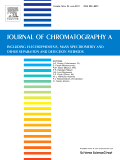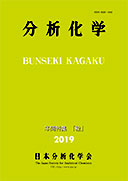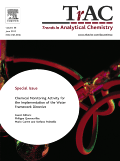
JOURNAL OF CHROMATOGRAPHY A
Scope & Guideline
Fostering Excellence in Analytical Research
Introduction
Aims and Scopes
- Chromatographic Method Development:
Research often focuses on the optimization and development of new chromatographic methods, including high-performance liquid chromatography (HPLC), supercritical fluid chromatography (SFC), and capillary electrophoresis, aimed at improving separation efficiency and analytical sensitivity. - Application in Various Fields:
The journal covers diverse applications of chromatographic techniques in pharmaceuticals, environmental analysis, food safety, and biomolecular studies, showcasing how chromatography can be employed to solve real-world analytical challenges. - Innovative Analytical Techniques:
There is a consistent focus on the integration of chromatography with other techniques such as mass spectrometry (MS), nuclear magnetic resonance (NMR), and various spectroscopic methods to enhance analytical capabilities. - Sustainability and Green Chemistry:
Recent trends in the journal highlight the importance of sustainable practices in chromatography, including the development of green solvents and eco-friendly extraction techniques. - Computational and Theoretical Approaches:
The journal also emphasizes theoretical modeling and computational methods to predict retention behaviors, optimize chromatographic processes, and understand underlying mechanisms in separations.
Trending and Emerging
- Miniaturized and Portable Chromatography:
There is a growing trend towards the development of miniaturized and portable chromatographic systems, which allow for on-site analysis and enhance the accessibility of chromatographic techniques for field studies. - Integration of Machine Learning and AI:
The application of machine learning and artificial intelligence in chromatography is emerging, particularly for retention time prediction and method optimization, showcasing the intersection of computational science with traditional analytical techniques. - Focus on Biopharmaceuticals and Biological Samples:
Research related to the purification and analysis of biopharmaceuticals, including monoclonal antibodies and oligonucleotides, is increasingly prominent, reflecting the growing importance of biologics in medicine. - Sustainability and Green Analytical Chemistry:
A notable trend towards sustainable practices in chromatography, including the use of green solvents and eco-friendly extraction methods, is becoming more prevalent as environmental concerns shape research priorities. - Advanced Characterization Techniques:
There is an increasing emphasis on comprehensive analytical strategies that combine multiple techniques, such as two-dimensional liquid chromatography and integrated mass spectrometry, to achieve higher resolution and detailed profiling of complex samples.
Declining or Waning
- Traditional Chromatographic Techniques:
There appears to be a decline in publications focusing solely on traditional chromatographic techniques without integration with modern technologies, as researchers increasingly seek innovative approaches that combine multiple analytical methods. - Basic Method Validation Studies:
The frequency of basic method validation studies has decreased, possibly due to the growing expectation for more complex and nuanced validations that account for real-world variability and robustness. - Non-target Analysis in Environmental Samples:
Although still relevant, the emphasis on non-target analysis in environmental studies has shifted towards more targeted approaches, especially as regulatory frameworks evolve, leading to a decrease in purely exploratory studies. - Standard Operating Procedures (SOPs) for Chromatography:
There has been a noticeable decline in papers focused on SOPs as the field moves towards more innovative and flexible methodologies that prioritize adaptability and efficiency over rigid protocols.
Similar Journals

JPC-JOURNAL OF PLANAR CHROMATOGRAPHY-MODERN TLC
Connecting Researchers to Cutting-Edge TLC Insights.JPC-JOURNAL OF PLANAR CHROMATOGRAPHY-MODERN TLC, published by Springer Heidelberg, is a pivotal resource in the fields of Analytical Chemistry, Biochemistry, and Clinical Biochemistry. With an ISSN of 0933-4173 and an E-ISSN of 1789-0993, this journal serves as an essential platform for the dissemination of innovative research on planar chromatography techniques, specifically modern thin-layer chromatography (TLC). With its upcoming coverage extending to 2024 and a third quartile ranking (Q3) across major scientific categories in 2023, it addresses the critical advancements and applications in analytical methods. Although it does not offer open access, the journal's rigorous peer-review process ensures high-quality findings that contribute to the progression of these vital scientific disciplines. The journal is located in Heidelberg, Germany, and continues to be a beacon for researchers, professionals, and students who seek to enhance their knowledge and practice in chromatographic techniques.

Journal of Analysis and Testing
Transforming knowledge into impactful analytical practices.Journal of Analysis and Testing is a premier academic journal published by SPRINGER SINGAPORE PTE LTD, dedicated to advancing the fields of analytical and environmental chemistry. With ISSN 2096-241X and E-ISSN 2509-4696, the journal has established a significant presence since its inception in 2017, converging its focus until 2024. The journal's outstanding rankings in 2023, including Q1 quartile placements in Analytical Chemistry, Instrumentation, and Spectroscopy, underscore its pivotal role in disseminating high-quality research. Researchers can access cutting-edge studies that explore innovative testing methodologies, electrochemical analyses, and material evaluations, making it an essential resource for professionals and students alike. The Journal of Analysis and Testing not only celebrates advances in science and technology but also promotes interdisciplinary collaborations, ensuring widespread impact across analytical and environmental domains. As such, this journal plays a vital role in shaping the future of analytical practices and methodologies, positioning itself as a key conduit for knowledge exchange in the scholarly community.

BUNSEKI KAGAKU
Advancing the Frontiers of Analytical ChemistryBUNSEKI KAGAKU, published by the Japan Society Analytical Chemistry, is a reputable journal dedicated to the field of analytical chemistry. With an ISSN of 0525-1931, this journal has been a crucial outlet for scholarly communication since its inception in 1952, converging its publication years from 1954 to 1957 and from 1959 to 2024. Although it holds a Q4 category ranking in the most recent 2023 quartiles of analytical chemistry and ranks 153/156 in Scopus, it continues to serve as a platform for quality research, fostering advancements in the field. BUNSEKI KAGAKU is based in Tokyo, Japan, and emphasizes the critical importance of analytical techniques in scientific inquiry. With a commitment to professionalism and rigor, the journal provides a vital resource for researchers, students, and professionals seeking to explore innovative methodologies and contribute to the ongoing dialogue in analytical chemistry.

Food Analytical Methods
Empowering researchers to enhance food safety standards.Food Analytical Methods, published by Springer, is an esteemed journal dedicated to the innovative field of analytical methodologies within the food sciences. With an ISSN of 1936-9751 and E-ISSN of 1936-976X, this journal serves as a pivotal platform for researchers and professionals to exchange insights, methodologies, and findings related to food quality analysis, safety measures, and innovative technologies in food science. As of 2023, Food Analytical Methods boasts impressive Scopus rankings, including Q2 in Analytical Chemistry and Food Science, positioning it among the top journals in its category. The journal's commitment to enhancing food safety and quality through rigorous research underscores its importance in both academic and industrial applications. Although it does not currently operate under an open-access model, it provides exceptional value through its rigorous peer-review process and comprehensive publication standards, further inviting contributions from both established and emerging scientists in the field. With coverage spanning from 2008 to 2024, this journal continues to address critical research areas, thereby shaping the future of food analytics.

BMC Chemistry
Elevating Chemical Science with Impactful ResearchBMC Chemistry, published by BMC, is a reputable open access journal that has made significant strides since its inception in 2019. Operating under e-ISSN 2661-801X, this journal is dedicated to advancing the field of general chemistry by promoting high-quality research across various sub-disciplines. Headquartered in the United Kingdom, BMC Chemistry boasts a commendable impact factor and is classified in Q2 within the prestigious field of Chemistry (miscellaneous) according to the 2023 category quartiles. The journal's Scopus ranking places it at #139 out of 408 in its category, highlighting its growing relevance and influence in the academic community, with a commendable 66th percentile standing. With a commitment to open access, BMC Chemistry ensures that groundbreaking discoveries and innovative research are available to a global audience, fostering collaboration and development in chemistry. Researchers, professionals, and students alike will find this journal to be an invaluable resource for disseminating knowledge and driving scientific advancement.

LCGC EUROPE
Exploring the forefront of chromatographic techniques in Europe.LCGC EUROPE is a prominent journal dedicated to the field of analytical chemistry, specifically highlighting the latest trends and innovations in chromatographic techniques. Published by MJH Life Sciences, this journal has served as a valuable resource for researchers, professionals, and students interested in the nuances of laboratory practices and the advancement of instrumentation. Although LCGC EUROPE ceased its coverage in Scopus from 2018, it has maintained a significant influence within the community, evidenced by its Scopus rank of 90/114 in Analytical Chemistry, placing it in the 21st percentile. With its inception dating back to 1996, the journal provided essential insights and peer-reviewed articles, fostering a rich understanding of chromatographic science. While the journal is not currently open access, it remains an integral part of the literature for anyone engaged in the analytical chemistry landscape, especially as it pertains to laboratory methodologies and innovations.

LCGC North America
Delivering Insights for the Analytical Chemistry CommunityLCGC North America is a pivotal resource in the field of Analytical Chemistry, published by MJH Life Sciences. Since its inception in 1999, the journal has strived to bridge the gap between scientific research and practical applications, catering to a diverse audience that includes researchers, professionals, and students interested in chromatography and related analytical practices. Although currently categorized in the Q4 quartile of Analytical Chemistry, with a Scopus rank of #137 out of 156, LCGC North America is dedicated to delivering insightful articles that foster discussion and innovation within the analytical chemistry community. With a commitment to quality content, the journal covers a broad spectrum of topics, ensuring that readers remain informed about the latest developments and trends in the field. Despite its non-open access model, readers can access its valuable resources through institutional subscriptions and various library networks, making it a vital asset for those engaged in cutting-edge research and practice. Located in Cranbury, NJ, United States, LCGC North America continues to contribute significantly to the advancement of analytical methodologies and technologies.

TRAC-TRENDS IN ANALYTICAL CHEMISTRY
Pioneering Insights in Environmental and Spectroscopic AnalysisTRAC - Trends in Analytical Chemistry is a prestigious journal published by Elsevier Science Ltd, situated in the Netherlands. With an impressive impact factor reflected in its Q1 rankings across three major categories—Analytical Chemistry, Environmental Chemistry, and Spectroscopy—this journal stands at the forefront of disseminating pioneering research and advancements in the field of analytical chemistry. Established in 1981, TRAC provides a comprehensive platform for researchers to share influential studies and insights related to the latest trends, methodologies, and technologies in analytical techniques. Recognized globally, the journal excels in fostering cross-disciplinary dialogue and innovation, making it an indispensable resource for academics, professionals, and students alike. Explore the latest issues to stay abreast of cutting-edge developments that shape the analytical sciences.

MICROCHEMICAL JOURNAL
Fostering Knowledge in Analytical and Spectroscopic AdvancesMicrochemical Journal, published by Elsevier, stands as a leading scholarly publication in the fields of Analytical Chemistry and Spectroscopy, boasting impressive rankings of Q1 and Q2 in their respective categories for 2023. With an H-index reflecting its substantial impact and relevance, this journal has been a cornerstone of research dissemination since its inception in 1957, and it continues to play a vital role in advancing the methodological and technological innovations within these disciplines. The journal presents peer-reviewed articles that explore a wide array of topics, making it an essential resource for researchers, professionals, and students keen on the latest advancements in microchemical processes and techniques. Although it does not currently offer open access options, its publication through Elsevier ensures a high standard of academic integrity and wide accessibility through various academic institutions. With a strong Scopus ranking—9th in Chemistry Spectroscopy and 22nd in Analytical Chemistry—Microchemical Journal is an indispensable platform for empirical studies, insightful reviews, and pioneering methodologies in the microchemical domain.

Separations
Innovating for a Cleaner, More Efficient WorldSeparations is a prestigious open-access journal published by MDPI, dedicated to advancing the fields of analytical chemistry and filtration and separation processes. Established in 2014, the journal has swiftly emerged as a significant platform for disseminating groundbreaking research and innovative methodologies in separation science, boasting an impressive E-ISSN of 2297-8739 and operating out of Basel, Switzerland. With its focus rotating from 2016 through 2024, Separations has been categorized in the Q3 quartile for both analytical chemistry and filtration and separation disciplines as of 2023, demonstrating its relevance in these scientific areas. The journal's rankings in Scopus, with 93rd out of 156 in analytical chemistry and 15th out of 19 in chemical engineering filtration and separation, reflect its commitment to high-quality research accessible to a global audience. Researchers, professionals, and students will find valuable insights and pioneering findings that foster collaboration and innovation within the vibrant community of separation science.